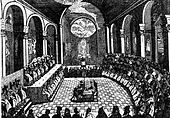
Back Konzil von Konstanz ALS Concilio de Gostanza AN مجمع كونستانس Arabic مجمع كونستانس ARZ Conceyu de Constanza AST Канстанцкі сабор Byelorussian Канстанцкі сабор BE-X-OLD Констанцки събор Bulgarian Concili de Constança Catalan Kostnický koncil Czech
This article needs additional citations for verification. (October 2016) |
| Council of Constance | |
|---|---|
 | |
| Date | 1414–1418 |
| Accepted by | Catholic Church |
Previous council | Vienne |
Next council | |
| Convoked by | Sigismund von Luxemburg and Antipope John XXIII, confirmed by Pope Gregory XII |
| Attendance | 600 |
| Topics | Western Schism, Hussitism, conciliarism |
Documents and statements | Deposition of John XXIII and Benedict XIII, condemnation of Jan Hus, election of Martin V, Haec sancta, Frequens |
| Chronological list of ecumenical councils | |
| Part of a series on the |
| Ecumenical councils of the Catholic Church |
|---|
 |
| 4th–5th centuries |
| 6th–9th centuries |
| 12th–14th centuries |
| 15th–16th centuries |
| 19th–20th centuries |
|
|
The Council of Constance (Latin: Concilium Constantiense;[1] German: Konzil von Konstanz) was an ecumenical council of the Catholic Church that was held from 1414 to 1418 in the Bishopric of Constance (Konstanz) in present-day Germany. This was the first time that an ecumenical council was convened in the Holy Roman Empire. The council ended the Western Schism by deposing or accepting the resignation of the remaining papal claimants and by electing Pope Martin V. It was the last papal election to take place outside of Italy.
The council also condemned Jan Hus as a heretic and facilitated his execution; and it ruled on issues of national sovereignty and the rights of pagans and just war in response to a conflict between the Grand Duchy of Lithuania, the Kingdom of Poland and the Order of the Teutonic Knights.
The council is also important for its role in the debates over ecclesial conciliarism and papal supremacy. Constance issued two particularly significant decrees regarding the constitution of the Catholic Church: Haec sancta (1415), which asserted the superiority of ecumenical councils over popes in at least certain situations, and Frequens (1417), which provided for councils to be held automatically every ten years. The status of these decrees proved controversial in the centuries after the council, and Frequens was never put into practice. Though Haec sancta, at least, continued to be accepted as binding by much of the church up to the 19th century, present-day Catholic theologians generally regard these decrees as either invalid or as practical responses to a particular situation without wider implications.
- ^ Laínez, Diego (January 6, 1886). Jacobi Laínez Disputationes Tridentinae. F. Rauch – via Google Books.